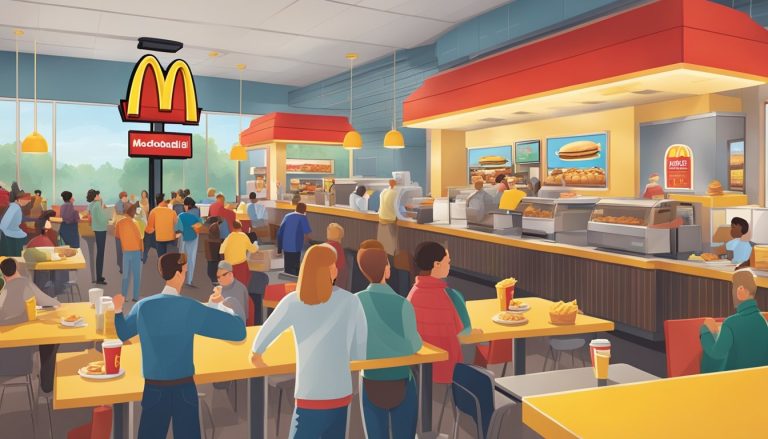McDonald’s revolutionized the fast-food industry when it introduced its breakfast menu nationwide in 1977. The innovative offerings, including the iconic Egg McMuffin, quickly captured consumers’ appetites and wallets. By 2012, McDonald’s was generating $10 billion annually from breakfast sales alone in the United States, showcasing the immense potential of the morning meal market.
This success did not go unnoticed by competitors. Other fast-food chains recognized the lucrative opportunity and began developing their own breakfast menus. Burger King, Jack in the Box, and later Taco Bell all entered the fray, sparking what became known as the “Breakfast Wars.”
The battle for breakfast supremacy continues to this day, with chains constantly innovating and expanding their morning offerings. From McMuffins to breakfast burritos, the competition has led to a diverse array of options for early risers seeking convenient, on-the-go meals. As the market evolves, fast-food giants continue to vie for a larger slice of the breakfast pie, making mornings an increasingly important battleground in the industry.
The Rise of Breakfast at McDonald’s
McDonald’s transformed the fast-food landscape by introducing and expanding its breakfast menu. This strategic move revolutionized morning dining habits and established the company as a breakfast powerhouse.
Historical Perspective and Pioneering Breakfast Menu
McDonald’s ventured into the breakfast market in the early 1970s. The company recognized an untapped opportunity to serve customers seeking quick, convenient morning meals. In 1972, McDonald’s debuted its first breakfast menu.
The initial offerings included hotcakes, toasted English muffins, scrambled eggs, sausage, hash browns, and Danish pastries. This diverse selection catered to various taste preferences and dietary needs.
McDonald’s innovative approach to breakfast set a new standard in the fast-food industry. It challenged competitors to develop their own morning menus, sparking the beginning of the breakfast wars.
Introduction of the Iconic Egg McMuffin
The Egg McMuffin, introduced in 1972, became the cornerstone of McDonald’s breakfast menu. Created by franchise owner Herb Peterson, this sandwich revolutionized on-the-go breakfast options.
The Egg McMuffin featured a toasted English muffin, Canadian bacon, a poached egg, and American cheese. Its portable nature and satisfying taste quickly made it a customer favorite.
This iconic sandwich paved the way for future breakfast innovations at McDonald’s. It remains a beloved menu item, even as the company continues to evolve its morning offerings.
Expansion of Breakfast Offerings Over Time
McDonald’s gradually expanded its breakfast menu to cater to changing consumer preferences. The company introduced the Big Breakfast in 1977, featuring scrambled eggs, sausage, hash browns, and a biscuit.
In the following years, McDonald’s added more options:
- Sausage McMuffin (1981)
- McGriddles (2003)
- Fruit & Maple Oatmeal (2011)
The company also adapted its menu to regional tastes, offering items like the McArabia Halloumi in the Middle East and Bubur Ayam McD in Malaysia.
In 2015, McDonald’s launched All-Day Breakfast in the United States, allowing customers to enjoy morning favorites throughout the day. This move further solidified the company’s position as a breakfast leader.
McDonald’s in the Fast-Food Industry Landscape
McDonald’s dominates the fast-food breakfast market, but faces growing competition as rivals expand their morning offerings. The company’s breakfast menu plays a crucial role in shaping American breakfast culture and dining habits.
Comparing McDonald’s Breakfast with Competitors
McDonald’s breakfast menu features iconic items like the Egg McMuffin and hash browns. Burger King counters with its Croissan’wich and French Toast Sticks. Taco Bell entered the breakfast arena with unique options like the Breakfast Crunchwrap.
McDonald’s maintains an edge through its all-day breakfast availability in many locations. This flexibility appeals to customers seeking breakfast items outside traditional morning hours.
Pricing strategies vary among competitors. McDonald’s often uses value menu options to attract budget-conscious consumers. Burger King and Taco Bell frequently offer promotional deals to compete.
Quality perceptions differ between chains. McDonald’s emphasizes fresh-cracked eggs in many breakfast items. Some rivals use similar tactics to position their offerings as higher quality.
The Role of McDonald’s in the Breakfast Culture
McDonald’s has significantly influenced American breakfast habits since introducing the Egg McMuffin in 1971. The chain popularized the concept of quick, portable breakfast sandwiches.
This shift towards convenience transformed morning routines for millions. Many consumers now view fast-food breakfast as a viable alternative to home-cooked meals.
McDonald’s breakfast menu adaptations reflect changing tastes. The introduction of healthier options like oatmeal and fruit parfaits caters to health-conscious customers.
The company’s marketing campaigns often center around breakfast. Slogans like “You Deserve a Break Today” encouraged treating oneself to breakfast out.
McDonald’s breakfast innovations have inspired competitors and local eateries alike. Many restaurants now offer their take on classic McDonald’s breakfast items.
All-Day Breakfast and Customer Demand
McDonald’s revolutionized fast-food breakfast with its all-day breakfast initiative. This move catered to changing consumer habits and reshaped industry expectations.
The Launch and Success of the All-Day Breakfast Initiative
McDonald’s introduced all-day breakfast in October 2015, responding to long-standing customer requests. The launch was a resounding success, driving significant sales growth. Popular items like Egg McMuffins and hash browns became available beyond traditional morning hours.
This expansion allowed McDonald’s to tap into new customer segments, including late-risers and shift workers. The move also attracted millennials, who often prefer breakfast foods throughout the day. Sales figures showed a marked increase, with breakfast items accounting for a larger portion of overall revenue.
How All-Day Availability Changed the Game
All-day breakfast availability transformed fast-food dynamics. Competitors scrambled to adapt, with many expanding their own breakfast offerings. This shift blurred traditional mealtime boundaries, giving customers more flexibility in their dining choices.
The change also impacted McDonald’s operations. Kitchens required reconfiguration to accommodate simultaneous preparation of breakfast and lunch items. Menu optimization became crucial, balancing all-day breakfast options with regular menu items.
Customer behavior evolved, with breakfast foods becoming popular choices for lunch and dinner. This trend influenced broader food industry patterns, as other restaurants and food manufacturers capitalized on the growing demand for breakfast-inspired options throughout the day.
Innovation and Adaptation in Breakfast Offerings
McDonald’s has continuously evolved its breakfast menu to meet changing consumer preferences and stay competitive in the fast-food breakfast market. The company has focused on introducing healthier options and seasonal items to appeal to a broader customer base.
Health Conscious Additions to the Menu
McDonald’s recognized the growing demand for nutritious breakfast choices and responded with several healthier options. The Egg White Delight McMuffin, introduced in 2013, features a whole grain English muffin, egg whites, and Canadian bacon. This lower-calorie alternative to the classic Egg McMuffin caters to health-conscious customers.
The fast-food giant also added oatmeal to its menu, providing a fiber-rich option for those seeking a lighter breakfast. Fruit and maple oatmeal comes topped with diced apples, cranberries, and raisins, offering a more nutritious start to the day.
Yogurt parfaits joined the lineup as another healthier choice. These parfaits layer low-fat yogurt with fresh berries and granola, appealing to customers looking for a quick yet wholesome breakfast option.
Seasonal and Limited-Time Breakfast Specials
McDonald’s has leveraged seasonal offerings and limited-time specials to create excitement and drive sales in its breakfast segment. The introduction of Donut Sticks in 2019 aimed to compete with popular coffee shop pastries. These sweet, crispy treats were designed to pair perfectly with McCafé coffee.
Holiday-themed breakfast items have also made appearances on the menu. Pumpkin spice-flavored products often emerge during the fall season, tapping into the popular flavor trend.
Limited-time promotions, such as the brief return of the McGriddle French Toast sandwich, generate buzz and encourage customers to visit before the items disappear. These temporary additions keep the breakfast menu fresh and interesting for regular patrons.
Marketing Strategies and Brand Positioning
McDonald’s employs targeted marketing strategies to maintain its dominant position in the fast-food breakfast market. The company leverages advertising campaigns and strategic partnerships to promote its breakfast offerings and stay ahead of competitors.
Advertising Campaigns for Breakfast Wars
McDonald’s invests heavily in advertising to promote its breakfast menu. The company uses a mix of traditional and digital media to reach diverse audiences. Television commercials showcase the variety and quality of breakfast items, often featuring the iconic Egg McMuffin.
Social media platforms play a crucial role in McDonald’s breakfast marketing. The brand creates engaging content on Instagram, Twitter, and Facebook to highlight limited-time offers and new menu additions. McDonald’s also utilizes influencer partnerships to generate buzz around breakfast promotions.
Localized campaigns cater to regional tastes and preferences. In some markets, McDonald’s emphasizes all-day breakfast availability to differentiate itself from competitors.
Collaborations and Partnerships
McDonald’s forms strategic alliances to enhance its breakfast offerings and appeal to new customer segments. The company collaborates with popular coffee brands to improve its McCafé line, competing directly with coffee shop chains.
Celebrity endorsements boost the visibility of McDonald’s breakfast menu. The brand partners with athletes, musicians, and actors to create signature breakfast items or promote existing ones.
McDonald’s also teams up with delivery services to expand breakfast accessibility. These partnerships allow customers to enjoy McDonald’s breakfast at home or work, increasing convenience and market reach.
Cross-promotions with other brands create unique breakfast experiences. McDonald’s occasionally collaborates with food manufacturers to introduce co-branded breakfast items, generating excitement and driving sales.
Assessing the Impact on the Fast-Food Breakfast Market
McDonald’s breakfast offerings reshaped the fast-food landscape, sparking intense competition and altering consumer habits. This shift had far-reaching consequences for industry economics and supply chains.
Economic Analysis of Breakfast Sales
Fast-food breakfast sales have grown significantly since McDonald’s popularized the concept. The morning meal now accounts for 20-25% of McDonald’s total revenue. This trend has pushed competitors to expand their breakfast menus, leading to market saturation.
Breakfast items often have higher profit margins than lunch or dinner options. Lower ingredient costs and premium pricing contribute to this profitability. The extended breakfast hours also help smooth out sales throughout the day.
Consumer spending on fast-food breakfasts has increased by 5-7% annually over the past decade. This growth outpaces other meal segments, highlighting breakfast’s importance to the industry’s overall financial health.
The Breakfast Menu’s Influence on the Supply Chain
The rise of fast-food breakfast has transformed supply chains across the industry. Egg demand has surged, with McDonald’s alone using over 2 billion eggs annually in the U.S. This increase has led to partnerships with egg suppliers and investments in sustainable farming practices.
Coffee consumption has also spiked, prompting fast-food chains to source higher-quality beans. Many have established direct relationships with coffee farmers to ensure consistent supply and quality.
The need for fresh ingredients has pushed companies to improve their cold storage and transportation systems. This has resulted in more frequent deliveries and stricter quality control measures.
Packaging innovations have emerged to accommodate on-the-go breakfast items. New materials and designs help maintain food temperature and quality during transit.
Future of Breakfast at McDonald’s
McDonald’s breakfast offerings continue to evolve as the fast food chain adapts to changing consumer preferences and market trends. The company is exploring innovative menu items and service models to maintain its competitive edge in the breakfast segment.
Potential Innovations and Market Trends
McDonald’s is likely to focus on healthier breakfast options to cater to health-conscious consumers. Plant-based alternatives for traditional breakfast meats may be introduced. The chain could experiment with customizable breakfast bowls or wraps, allowing customers to mix and match ingredients.
Digital ordering and delivery services for breakfast items are expected to expand. McDonald’s may invest in AI-driven personalized recommendations to enhance the breakfast experience. Seasonal and limited-time breakfast offerings could become more frequent to create buzz and drive sales.
Challenges and Opportunities Ahead
McDonald’s faces competition from other fast food chains and local cafes in the breakfast market. Maintaining food quality and consistency across locations remains a priority. The company must balance menu innovation with operational efficiency to keep costs manageable.
Rising ingredient costs and supply chain disruptions pose challenges. However, these issues also present opportunities for McDonald’s to streamline its breakfast menu and focus on high-profit items. The chain may explore partnerships with popular coffee brands or local suppliers to differentiate its breakfast offerings.
Adapting to regional tastes and preferences could help McDonald’s capture a larger breakfast market share globally. The company might introduce market-specific breakfast items to cater to local palates.




